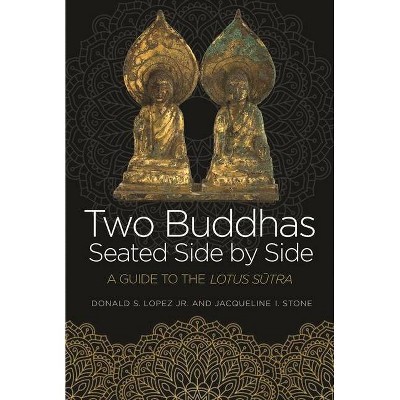Sponsored

Brains, Buddhas, and Believing - by Dan Arnold (Paperback)
In Stock
Sponsored
About this item
Highlights
- Premodern Buddhists are sometimes characterized as veritable "mind scientists" whose insights anticipate modern research on the brain and mind.
- About the Author: Dan Arnold is associate professor of philosophy of religions at the University of Chicago Divinity School, where he also received his Ph.D.
- 328 Pages
- Religion + Beliefs, Buddhism
Description
About the Book
Through a careful exploration of the philosophical problems commonly faced by the seventh-century Indian Buddhist thinker Dharmakirti and twenty-first-century philosophers such as Jerry Fodor and Daniel Dennett, Dan Arnold seeks to advance an understanding of both first-millennium Indian arguments and modern debates in philosophy of mind. The issues center on what modern philosophers have called intentionality--the fact that mental events are about (or mean, or represent) other things. Tracing an account of intentionality through the arguments of Dharmakirti and some of his contemporaneous Indian critics, as well as Kant, Wilfrid Sellars, and John McDowell, Arnold shows how seemingly arcane arguments among first-millennium Indian thinkers can illuminate matters still very much at the heart of present-day philosophy.
Book Synopsis
Premodern Buddhists are sometimes characterized as veritable "mind scientists" whose insights anticipate modern research on the brain and mind. Aiming to complicate this story, Dan Arnold confronts a significant obstacle to popular attempts at harmonizing classical Buddhist and modern scientific thought: since most Indian Buddhists held that the mental continuum is uninterrupted by death (its continuity is what Buddhists mean by "rebirth"), they would have no truck with the idea that everything about the mental can be explained in terms of brain events. Nevertheless, a predominant stream of Indian Buddhist thought, associated with the seventh-century thinker Dharmakirti, turns out to be vulnerable to arguments modern philosophers have leveled against physicalism.
By characterizing the philosophical problems commonly faced by Dharmakirti and contemporary philosophers such as Jerry Fodor and Daniel Dennett, Arnold seeks to advance an understanding of both first-millennium Indian arguments and contemporary debates on the philosophy of mind. The issues center on what modern philosophers have called intentionality--the fact that the mind can be about (or represent or mean) other things. Tracing an account of intentionality through Kant, Wilfrid Sellars, and John McDowell, Arnold argues that intentionality cannot, in principle, be explained in causal terms. Elaborating some of Dharmakirti's central commitments (chiefly his apoha theory of meaning and his account of self-awareness), Arnold shows that despite his concern to refute physicalism, Dharmakirti's causal explanations of the mental mean that modern arguments from intentionality cut as much against his project as they do against physicalist philosophies of mind. This is evident in the arguments of some of Dharmakirti's contemporaneous Indian critics (proponents of the orthodox Brahmanical Mimasa school as well as fellow Buddhists from the Madhyamaka school of thought), whose critiques exemplify the same logic as modern arguments from intentionality. Elaborating these various strands of thought, Arnold shows that seemingly arcane arguments among first-millennium Indian thinkers can illuminate matters still very much at the heart of contemporary philosophy.Review Quotes
...a rich and inspiring summary, livened up by many succint assessments of related positions.-- "Journal of the American Oriental Society"
...an important work of philosophy...--Charles Goodman "Notre Dame Philosophical Reviews"
Brains, Buddhas, and Believing is outstanding. It is exegetically robust, providing richly informed expositions of historical positions.... It is exciting and refreshing to read a book that coherently explicates common issues between distinct intellectual traditions with such philosophical rigor and independence of thought.--Bronwyn Finnigan "Journal of Religion"
Graduate students and scholars of Buddhist scholastic thought-particularly those engaged by the philosophical dimensions of Buddhism and science discourse-are in for a treat. Recommended.-- "Choice"
I recommend Brains, Buddhas, and Believing to anyone interested in philosophy of mind and to those who would like to learn about a vigorous non-Western philosophy often thought of in purely practical rather than theoretical terms.--Thomas Leahey "PsycCritiques"
The book admirably shows how the philosophical views of Dharmakirti and others are not just exhibits in the Indian Wing of the Museum of the History of Ideas, but positions that are of considerable importance in our attempts of addressing contemporary philosophical problems.--Jan Westerhoff "Religions of South Asia"
The book is strong both philosophically and philologically, with Arnold's characteristic erudition, analytic rigor, interpretive sensitivity, and enthusiasm evident throughout.--Richard Nance "H-Buddhism"
About the Author
Dan Arnold is associate professor of philosophy of religions at the University of Chicago Divinity School, where he also received his Ph.D. His first book, Buddhists, Brahmins, and Belief: Epistemology in South Asian Philosophy of Religion, won an American Academy of Religion Award for Excellence in the Study of Religion.Shipping details
Return details
Frequently bought together




Trending Non-Fiction













